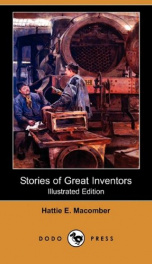Stories of Great Inventors

Robert Fulton (1765-1815) was an American engineer and inventor who is widely credited with developing the first commercially successful steamboat. He also designed a new type of steam warship. In 1800 he was commissioned by Napoleon Bonaparte to design Nautilus, which was the first practical submarine in history. Eli Whitney (1765-1825) was an American inventor best known as the inventor of the cotton gin. This was one of the key inventions of the industrial revolution and shaped the economy of the antebellum South. Whitney's invention made short staple cotton into a profitable crop, which strengthened the economic foundation of slavery. Samuel Finley Breese Morse (1791-1872) was an American painter of portraits and historic scenes, the creator of a single wire telegraph system, and Morse Code. Peter Cooper (1791-1883) was an American industrialist, inventor, philanthropist, and candidate for President of the United States. Thomas Alva Edison (1847-1931) was an American inventor and businessman who developed many devices that greatly influenced life around the world, including the phonograph and the long-lasting, practical electric light bulb.
Info about the book
Author:
Series:
Unknown
ISBN:
1103121871
Rating:
3.5/5 (3)Your rating:
0/5
Languge:
English
Users who have this book
Users who want this book
What readers are saying
What do you think? Write your own comment on this book!
write a commentGenre
if you like Stories of Great Inventors try:
Other books by this author
Do you want to read a book that interests you? It’s EASY!
Create an account and send a request for reading to other users on the Webpage of the book!

